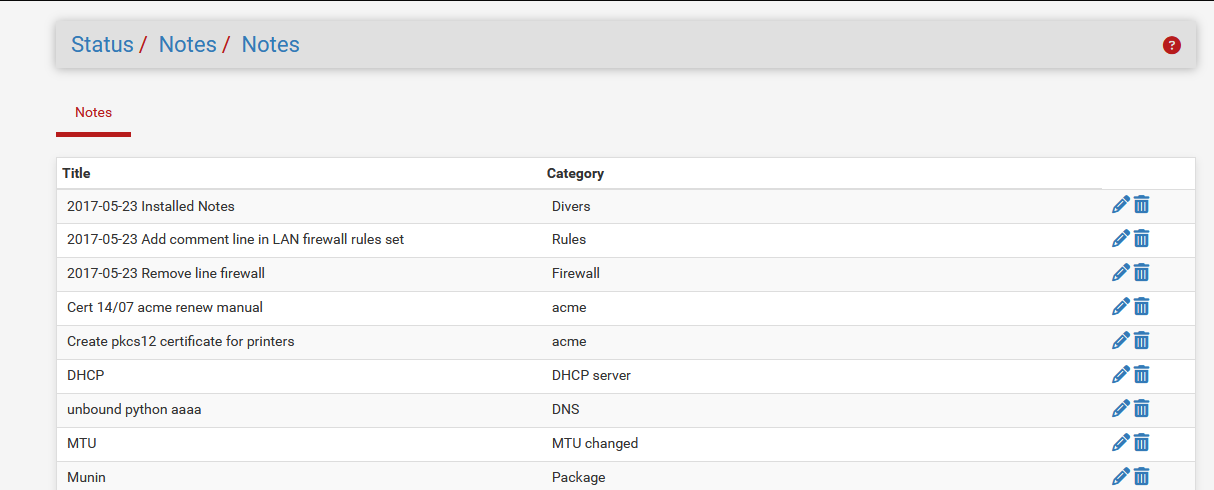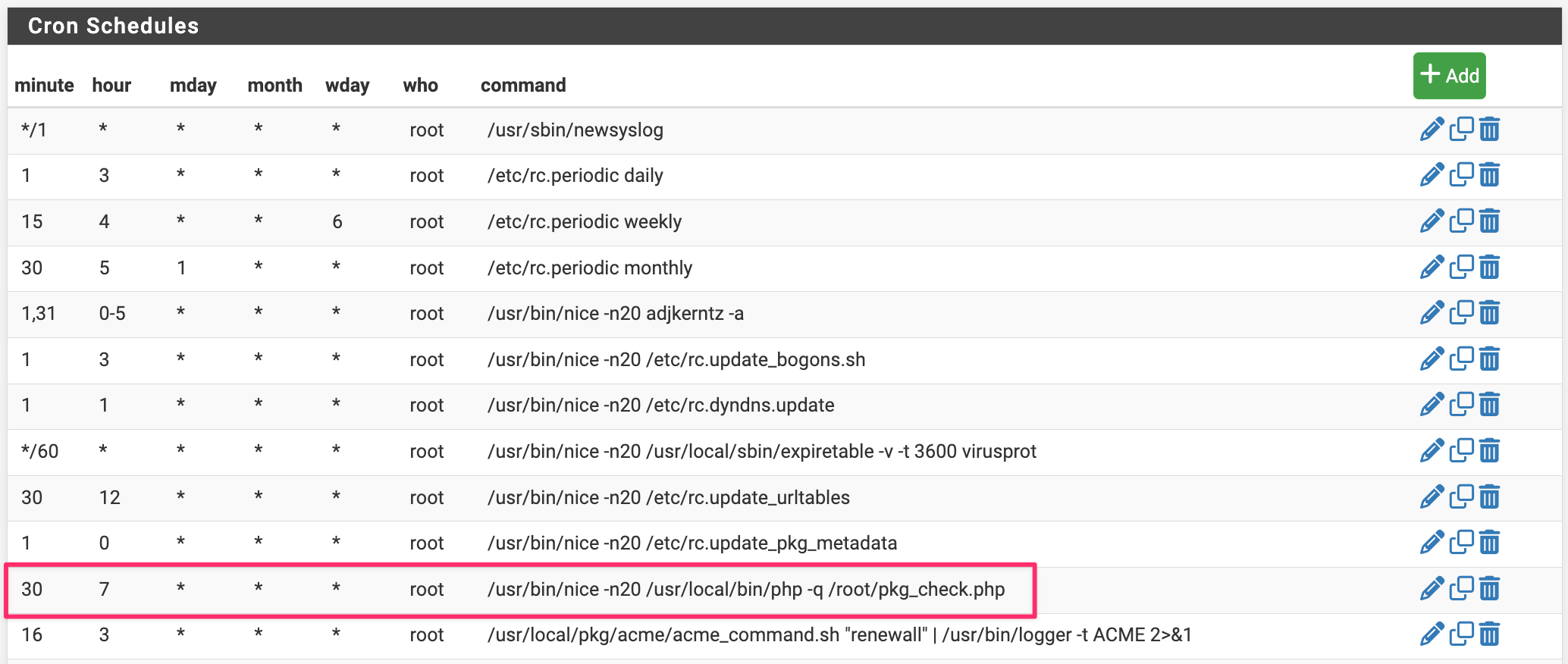Auto update check, checks for updates to base system + packages and sends email alerts
-
@wgstarks said in Auto update check, checks for updates to base system + packages and sends email alerts:
Should this script also send notifications for package updates?
Both pfSense packages, visible under System > Package Manage r>Installed Packages and non pfSense 'FreeBSD) packages (from the Netgate / pfSense repository) will send you a message / notification / mail.
Examples of both are shown above. Check out what @slm and @JonathanLee showed.
-
@Gertjan
I think I need another cup of coffee this morning.
The post should have said system patches not packages. Should I get notifications for new system patches? -
@wgstarks said in Auto update check, checks for updates to base system + packages and sends email alerts:
Should I get notifications for new system patches?
When new patches for the "System_Patches" are created, they are included in the "System_Patches" pfSense package. This will bump the version number. You see this as a new package, "System_Patches" avaible for you.
Upgrade it, and have a look at the new patch or patches, and apply that interest you, or, by default, apply them all.

-
@Gertjan
Looks like I need to do some troubleshooting when I get home. When I try to run the command/usr/local/bin/php -q /root/pkg_check.phpI get this-
Could not open input file: /root/pkg_check.php -
@wgstarks Permissions?

-
@provels
Actually it was missing completely. After upgrading from a 3100 to my 4200 many (or maybe all) packages were missing so it's not surprising that this script was also missing. Re-created it with the permissions you showed and all is working now.
Thanks -
That's not a pfSense package so it won't be added when restoring a config unless you've used the filer pkg.
-
 P provels referenced this topic on
P provels referenced this topic on
-
@stephenw10 said in Auto update check, checks for updates to base system + packages and sends email alerts:
That's not a pfSense package so it won't be added when restoring a config unless you've used the filer pkg.
Thanks. The filer package looks like it could be useful. I’ll have to install it and give it a try.
-
 W wgstarks referenced this topic on
W wgstarks referenced this topic on
-
To clarify, if there are no updates to any of the packages, does this script still send an email at the times as specified in your cron job? Thanks!
-
@MarinSNB said in Auto update check, checks for updates to base system + packages and sends email alerts:
To clarify, if there are no updates to any of the packages, does this script still send an email at the times as specified in your cron job? Thanks!
No. At least not in my case. I only get an email when an update exists.
-
@stephenw10 said in Auto update check, checks for updates to base system + packages and sends email alerts:
That's not a pfSense package so it won't be added when restoring a config unless you've used the filer pkg.
This question is way off topic for this thread (apologies) but since it looks like the filer pkg docs have been removed from pfsense docs perhaps you can tell me how to use filer to modify what is backed up by the auto config backup? I see a sync tab but the help link just links back to the full pfsense docs.
-
@wgstarks sounds good! That is what is am finding out here too! Thanks much!
-
@MarinSNB said in Auto update check, checks for updates to base system + packages and sends email alerts:
To clarify, if there are no updates to any of the packages, does this script still send an email at the times as specified in your cron job? Thanks!
It's 'open source' ;)

As the script language is somewhat backed up English, it says :
If the 'message' ($msg) is not empty (so there was a message ! == thing to update/upgrade) then
87) log a message in to system log ( here : StatusSystem LogsSystemGeneral )
88) show the message on the command line (visible if you executed the command yourself)
89) and... send/notify the message by mail.I 'see' you thinking : is it really that simple ? Yes, it is.
-
@wgstarks It stores custom files base64 encoded in the config. So you could use it to store the pkg_check.php file and it would be restore into a system when you restore the config. Though you might need to do it in several steps or manually save since the first boot would install the Filer package.
-
@stephenw10 said in Auto update check, checks for updates to base system + packages and sends email alerts:
@wgstarks It stores custom files base64 encoded in the config. So you could use it to store the pkg_check.php file and it would be restore into a system when you restore the config. Though you might need to do it in several steps or manually save since the first boot would install the Filer package.
So if I use filer rather than my usual SFTP for installing custom files they are added to the config which gets backed up by Auto Config Backup correct? So I should delete the current files and re-add them using filer?
-
You don't have to delete them. Filer simply won't do anything if the files are already there. And identical.
-
@stephenw10 said in Auto update check, checks for updates to base system + packages and sends email alerts:
Filer simply won't do anything if the files are already there. And identical.
But the object would be for filer to add the file to the config database.
-
@wgstarks said in Auto update check, checks for updates to base system + packages and sends email alerts:
So if I use filer rather than my usual SFTP for installing custom files they are added to the config which gets backed up by Auto Config Backup correct? So I should delete the current files and re-add them using filer?
I never used 'filer' myself, but yes, that's the beauty of the package :
When you export your config, you export it with packages and package 'settings'.
The filer package settings are, amongst others, the files and the place where they are stored.So, importing the config will import/install the package and will also import the config == settings of the package == big magic : all your private additions (files) are also restored.
For myself, I'm doing things the old fashioned way. Not that I stick dozens of Post-It's on my pfSense (I did that before) but I use the Notes package :

and I add, for every setting and change that I made a
Why / when / what to observe / where to get it, etc.
So, when I have to re-install pfSense, I also re install these Notes, and I have my road-book ready after a phenix event.
Hummmm. Maybe I should have a closer look at this filer package after all. -
@Gertjan
Thanks for the Notes suggestion. I lost a few packages recently and been thinking about creating a pfsense logbook since it looks like some packages in Package Manager don’t get included in backups and I’m willing to bet custom packages that aren’t in package manager won’t be either. This looks like it’s perfect for that. -
@stephenw10
can we make it a package my good sir?
